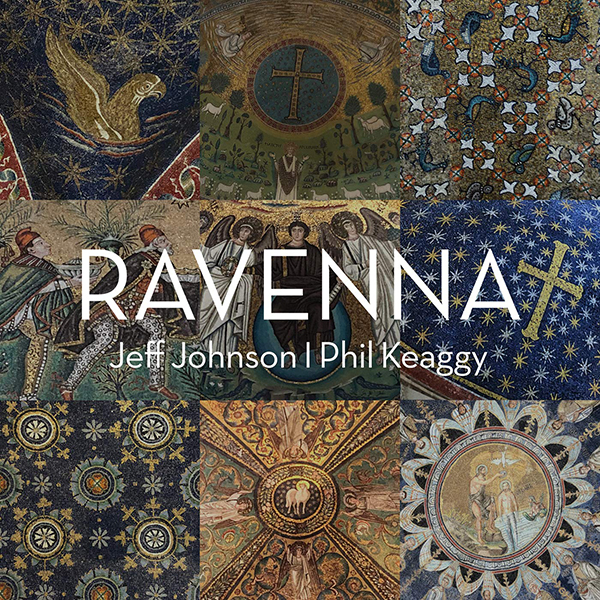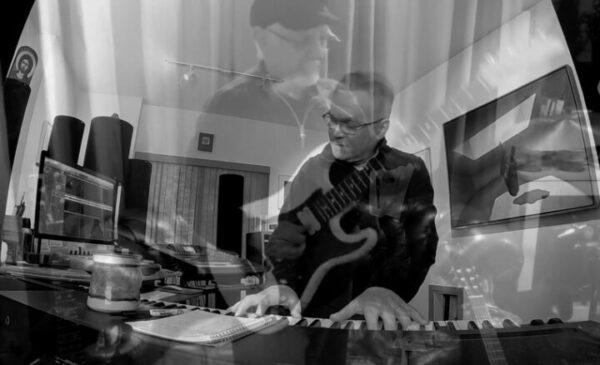 by John Diliberto 2/27/2021
by John Diliberto 2/27/2021
When Jeff Johnson and Phil Keaggy record together, their music always has a sense of place. They are usually inspired by locations, like the Frio River on their first two releases, Frio Suite and Watersky, and Cappadocia in Turkey for their third. They continue that trend with their latest album, Ravenna, named for an Italian town known for its Byzantine and Christian mosaics. But the real place that Johnson and Keaggy create is of the imagination and wonder. You can envisage Ravenna as the score to many an exotic journey.
Ravenna‘s compositions are titled as Mosaic, 1 through 8. I don’t know if I’d use the facile mosaic metaphor in describing this music, but it is intricate and brings together the vast musical colors at the disposal of these two musicians who have been doing this for a long time.
Phil Keaggy is still known for his work in the 70s with Glass Harp, a band that straddled psychedelic and progressive rock. He then went solo, winning polls in places like Guitar Player Magazine and broke out with the 1978 instrumental album, The Master and the Musician.
Jeff Johnson has also has enjoyed a long career. He began recording progressive keyboard music in 1980 and then got the Celtic bug and made several landmark recordings with Nightnoise‘s Irish flutist, Brian Dunning. They recorded on Windham Hill and Hearts of Space records, but mostly on Johnson’s own Ark Music label. He and Keaggy are both involved with the Christian music scene and they came together on a Christian retreat.. They began working together in 2009 with the album Frio Suite and now have Ravenna, their fourth recording.
Listening to this record, I couldn’t help thinking of Mike Oldfield of Tubular Bells fame. Like Oldfield’s Hergest Ridge, Ommadawn and Return to Ommadawn, Ravenna has a pastoral sensibility despite the electric instrumentation. And it’s in the tradition of complex layered instrumentals that Oldfield has created as Johnson and Keaggy mix multiple string instruments, guitars of all sorts, mandolin, bass and percussion in layered compositions that evoke timeless themes beyond their inspiration from Ravenna.
On Ravenna, Johnson leaves his Celtic influences largely behind, playing some of his most lyrical piano ever on tracks like “Mosaic 3.” And he breaks out his inner Deep Purple on “Mosaic 5,” evoking the sound of a 70’s Hammond B-3 organ sound in an unusual, but appropriately rocking section.
 Each of the eight Mosaics course through multiple movements. “Mosaic 2” includes Johnson’s plaintive piano theme with distant choral voices and Keaggy switching from plucked acoustic guitar to tremulous mandolin. But then another tessera of the mosaic comes in as Johnson orchestrates a smoky organ motif. “Mosaic 6” calls to mind the Eagles‘ “Hotel California,” when Keaggy switches to fingerstyle acoustic with a western touch and a south of the border rhythm, but then he turns it into a slow, Middle Eastern dervish on sustained electric guitar. I guess that was the Byzantine influence.
Each of the eight Mosaics course through multiple movements. “Mosaic 2” includes Johnson’s plaintive piano theme with distant choral voices and Keaggy switching from plucked acoustic guitar to tremulous mandolin. But then another tessera of the mosaic comes in as Johnson orchestrates a smoky organ motif. “Mosaic 6” calls to mind the Eagles‘ “Hotel California,” when Keaggy switches to fingerstyle acoustic with a western touch and a south of the border rhythm, but then he turns it into a slow, Middle Eastern dervish on sustained electric guitar. I guess that was the Byzantine influence.
Phil Keaggy is just an astounding player whose technique leaves you breathless. I’m not talking about speed, but touch and nuance. Guitar-heads know him, but since most of his work in the last five decades has been in the Christian music world, he’s never quite crossed over to the recognition he deserves.
The final track has the most overly Italian feel with Keaggy’s mandolin, but it quickly changes into more of a lysergic walk into the beyond. It’s a place we all probably need to go in these pandemic times.
I am always hesitant to pick repeat artists for CD of the Month, but Jeff Johnson and Phil Keaggy just keep making extraordinary albums and Ravenna is the fourth of them.
